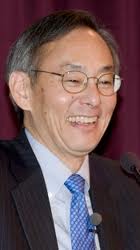Secretary Steven Chu Stepping Down at the U. S. DOE
In a letter to Energy Department employees on February 1st, Energy Secretary Steven Chu highlighted the progress of the last four years, and announced his decision to not serve a second term as Secretary. Text of the letter is below.
Dear Colleagues:
Serving the country as Secretary of Energy, and working alongside such an extraordinary team of people at the Department, has been the greatest privilege of my life. While the job has had many challenges, it has been an exciting time for the Department, the country, and for me personally.
>>>>> See the full text of the letter here. <<<<<
I want to conclude by making a few observations about the importance of the Department of Energy missions to our (a) economic prosperity, (b) dependency on foreign oil and (c) climate change.
The United States spent roughly $430 billion dollars on foreign oil in 2012. This is a direct wealth transfer out of our country. Many billions more are spent to keep oil shipping lanes open and oil geo-politics add considerable additional burdens. Although our oil imports are projected to fall to a 25 year low next year, we still pay a heavy economic, national security and human cost for our oil addiction.
The average temperature of our planet is rising, with majority of the temperature increase occurring in the last thirty years. During the three decades from 1980 to 2011, the number of violent storms, floods, droughts, heat waves, wildfires, as tabulated by the reinsurance company Munich Re, has increased more than three-fold. They also estimate that the financial losses follow a trend line that has gone from $40 billion to $170 billion dollars per year. Most of those losses were not insured, and the country suffering the largest losses by far is the United States. As the President said in his recent Inaugural Address, “some may still deny the overwhelming judgment of science, but none can avoid the devastating impact of raging fires, and crippling drought, and more powerful storms.”
The overwhelming scientific consensus is that human activity has had a significant and likely dominant role in climate change. There is also increasingly compelling evidence that the weather changes we have witnessed during this thirty year time period are due to climate change.
Virtually all of the other OECD countries, and most developing countries including China, India, Mexico, and Brazil have accepted the judgment of climate scientists.
Many countries, but most notably China, realize that the development of clean energy technologies presents an incredible economic opportunity in an emerging world market. China now exceeds the U.S. in internal deployment of clean energy and in government investments to further develop the technologies.
While we cannot accurately predict the course of climate change in the coming decades, the risks we run if we don’t change our course are enormous. Prudent risk management does not equate uncertainty with inaction.
Our ability to find and extract fossil fuels continues to improve, and economically recoverable reservoirs around the world are likely to keep pace with the rising demand for decades. As the saying goes, the Stone Age did not end because we ran out of stones; we transitioned to better solutions.
The same opportunity lies before us with energy efficiency and clean energy. The cost of renewable energy is rapidly becoming competitive with other sources of energy, and the Department has played a significant role in accelerating the transition to affordable, accessible and sustainable energy.
Ultimately we have a moral responsibility to the most innocent victims of adverse climate change. Those who will suffer the most are the people who are the most innocent: the world’s poorest citizens and those yet to be born. There is an ancient Native American saying: “We do not inherit the land from our ancestors, we borrow it from our children.” A few short decades later, we don’t want our children to ask, “What were our parents thinking? Didn’t they care about us?”
…… More ……..
The journey that I began with you four years ago will continue for many years. I began my message talking about my vision of what I wanted to do with the Department. Some of those goals have been realized, and we have planted many seeds together. Just as today’s boom in shale gas production was made possible by Department of Energy research from 1978 to 1991, some of the most significant work may not be known for decades. What matters is that our country will reap the benefits of what we have started.
Stephen Chu, Secretary, U. S. Department of Energy, February 1, 2013
>>>>>>>>>> ………. <<<<<<<<<<
NOTE: See also “Energy Secretary Steven Chu Resigns, Chastises Climate Deniers And Clean-Energy Critics.”

